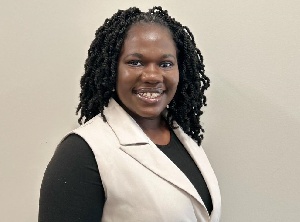- Home - News
- Elections 2024
- News Archive
- Crime & Punishment
- Politics
- Regional
- Editorial
- Health
- Ghanaians Abroad
- Tabloid
- Africa
- Religion
- Photo Archives
- Press Release
General News of Tuesday, 3 June 2025
Source: www.ghanawebbers.com
Rising Star: Yvonne Dadson’s groundbreaking research earns international recognition
Ghanaian youth continue to shine on the international stage. Yvonne Appiah Dadson, a Ghanaian scholar, recently won the “Best Paper Award” at ISCRAM 2023. This conference took place in Omaha, Nebraska, USA.
Dadson is pursuing her doctorate in Information Science at the University at Albany. Her award-winning research focused on COVID-19 contact tracing apps in New York. It was praised for its depth and originality by global experts.
Her study examined how New Yorkers used these apps during the pandemic. She analyzed public attitudes, privacy concerns, and social impacts of technology. Dadson also considered factors like race, age, and trust that affect technology adoption.
This research offers important insights for both the United States and Ghana. The lessons on trust and inclusivity are vital for Ghana's digital crisis management efforts.
However, Dadson’s success raises a troubling question: why do talented individuals often thrive abroad? They struggle to gain recognition and support at home.
ISCRAM is a premier conference that attracts top minds from around the world. It focuses on advances in emergency management and information systems. Since its inception, ISCRAM has become a key platform for impactful research.
Imagine if Dadson had conducted her research in Ghana during COVID-19 from 2020 to 2023. Her work could have provided valuable insights into digital health tool adoption across urban and rural areas.
Ghana faced significant infection rates during COVID-19, especially in cities like Accra and Kumasi. The government implemented lockdowns and introduced technology-based measures like the GH COVID-19 Tracker App. However, challenges included smartphone access issues and public fears about surveillance.
Dadson’s work highlights the need for culturally sensitive technology adoption in Ghana. This issue is crucial as African countries strengthen their digital public health infrastructure.
If her research had taken place in Ghana, it could have revealed barriers affecting attitudes toward contact tracing apps. Understanding these factors would help design better communication strategies tailored to local needs.
We often lament losing our scholars to Western countries but let’s focus back on Dadson's impact. Her work extends beyond New York; it provides guidance for future public health crises.
If her research had been based in Ghana, it could have built stronger public trust in digital health solutions. This would lead to higher app adoption rates and improve responses to health crises—strengthening Ghana’s role as a leader in digital health innovation within Africa.











